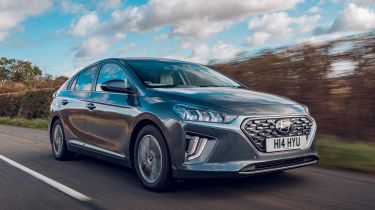Hyundai Ioniq Plug-In (2016-2022) performance, engine & drive
You can make fairly rapid progress in the Hyundai Ioniq Plug-In – once the gearbox has decided what it wants to do
| 0-62mph | Top speed | Driven wheels | Power |
|---|---|---|---|
| 10.6secs | 110mph | Front | 139bhp |
Hybrid cars like the Ioniq Plug-In combine the best of both automotive worlds: an electric motor and a petrol engine. On their own, performance is rather modest, but when combined, they help the Ioniq to get off the line smartly.
Hyundai Ioniq Plug-In hybrid engine, 0-62mph and acceleration
The Hyundai Ioniq Plug-In features a 60bhp electric motor coupled with a 104bhp 1.6-litre petrol engine. Together, they provide 139bhp, delivering roughly the same level of performance as a turbocharged diesel car. Acceleration from 0-62mph takes just 10.6 seconds and top speed is 111mph.
However, thanks to the instant torque of its electric motor, the Ioniq feels quite brisk from a standstill, even if the Toyota Prius Plug-In ultimately feels faster once on the move. In-gear acceleration is also usefully strong; accelerating from 50-70mph takes only 13.2 seconds – helpful when joining a motorway from a slip road. Unless you’re using EV mode, the petrol engine cuts in with reasonable refinement when required, but the dual-clutch six-speed automatic gearbox isn’t the cleverest around; it can feel sluggish when changing up through the gears or if you suddenly need a spurt of acceleration.
You get a choice of driving modes, including that EV mode, which keeps the Ioniq running on electricity alone until the battery is almost drained. Using just the electric motor allows for smooth and very quiet progress in town, and we imagine most owners will try to make maximum use of this feature by recharging the battery at home every night. But with only 60bhp on tap, you may start to hold up traffic along challenging country lanes or on motorway inclines, so this mode is best used in town only. In hybrid mode, the Ioniq does a good job of juggling electric and petrol power, while attempting to use the electric motor more often and for longer than the Ioniq Hybrid model.
In its strongest setting, the Ioniq hybrid's regenerative braking system offers the possibility of 'one-pedal' driving, similar to the 'e-Pedal' setup in the Nissan Leaf. After a few miles getting used to it, with sufficient anticipation, it's possible to bring the car to a stop merely by lifting off the at the right time, recuperating significant energy in the process. The lightest setting feels barely any different to just lifting off the throttle in a car without regenerative braking, but is quite effective in slow, stop-start traffic, while the middle setting offers an appropriate compromise between the two extremes.
Handling
The Ioniq isn’t as good to drive as a Prius. Its ride is too firm, with the wheels springing back harshly over lumps and bumps; the Prius is smoother over the same surfaces. Also, the Ioniq isn’t as comfortable as its Japanese rival, because the chassis feels more unsettled and nervous compared with the more forgiving Toyota. There’s also more road noise.
There's a fair amount of body lean if you throw the car at a corner, but you'll find that a pretty unsatisfying exercise. That's because while the steering is accurate enough, it’s devoid of feel, so you’re never quite sure what the front wheels are doing. In addition, the Ioniq's tyres are designed for economy rather than grip – this is a car that likes to take things easy rather than be hustled down a twisty road.



